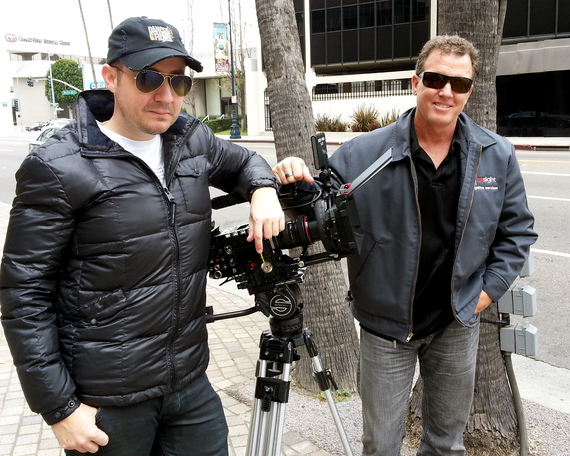Tupac was killed in a drive-by shooting in Las Vegas after a Mike Tyson fight twenty years ago. Through police incompetence, witness' refusal to talk, and the gangster code of silence the homicide is no closer to being solved today then it was in 1996. Last January, filmmaker Mike Dorsey, released Murder Rap, a controversial documentary that uncovered new evidence and put forth a new theory in Tupac's death. Murder Rap clearly points the finger at Sean "Puff Daddy" Combs, making the allegation that he was responsible for Tupac's demise, as part of the East Coast/West Coast rap beef that was all the rage in 1995, dominating the news and headlines. Gangsta rap was front and center when hip-hop lost two of its beloved in a matter of months. On the anniversary of Tupac's death I talked to Dorsey about his film, Tupac's legacy, and when, if ever, the rapper's murder will be solved.
Your film came out at the beginning of the year and now it's the 20th anniversary of Tupac's murder. What light do you think your film has shown on the case?
Murder Rap: Inside the Biggie and Tupac Murders is the world's first look at the official investigations into Tupac's murder. Most people don't realize that this case was worked by multiple teams of detectives spanning nearly 15 years. The case files took up over 90 binders. Up until Murder Rap, the public had only been shown bits and pieces of outdated case files that had leaked out, and then fans were left to speculate based on that sliver of information. That's resulted in a lot of wild conspiracy theories. Murder Rap puts all of that to rest.
Both Tupac and Biggie's killers are named. A federalized task force was started in 2006, originally tasked with solving the 1997 murder of Biggie Smalls in Los Angeles. That three year investigation led them into the Tupac murder case when they determined that the two murders were connected. Backed by federal resources and a team with experience working gang and drug cases in South Central LA, they were able to secure a taped confession to Tupac's murder. There is no longer any doubt about who pulled the trigger that tragic night in Vegas.
Has anyone in law enforcement contacted you about your film and possible theories or evidence? Has there been any action or movement on Tupac's case? Why or why not?
I've talked to a few other detectives who were connected to this case at various points throughout the past 20 years. I can say that there seems to be near unanimous support among people who've worked this case the longest regarding who pulled the trigger. There are other details surrounding the case that people may disagree on, but it's tough for any reasonable person to deny who the shooter was. We've also been contacted by people who were close to Tupac, and people who were from the same streets as his alleged killer, and they've corroborated what Murder Rap shows.
It seems like the streets of Compton always knew who Tupac's killer was. There are several reasons that there will never be any new movement on the case. The shooter and the majority of the people who were with him that night are dead. And there's a difference between knowing who did something, and being able to get a conviction for it in court. Detective Greg Kading, the head of the task force investigation that Murder Rap is about, wrote the book Murder Rap so that at least Tupac's fans, friends and family can know what happened, even if justice isn't possible.
What about Puff Daddy's camp. Any word from them or did they answer the allegations or threaten to sue you or anything?
We haven't been threatened by anybody. Some people have been asked about it, but they've shrugged it off.
Why do you think Tupac has become such a lasting icon?
I think he was the Renaissance Man of 90s rap. He was an actor. He was a rapper. He was a poet. He had the foundation to be a political leader. He was a charismatic speaker. It was more than just having talent for doing one thing. And when you combine that with the fact that his life was cut short at such a young age, you get the formula for a cultural icon. Like James Dean dying after only having major rolls in three movies, it's as much about how much unrealized potential was lost when he died.
Check out this video about Tupac's murder.

